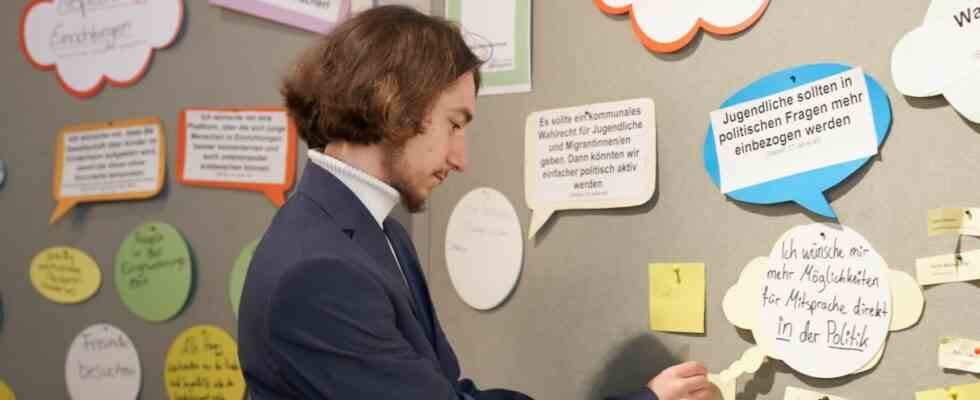The conference is almost over when it suddenly gets loud. “We’re not a country that can be proud of its school system,” says Sophie Kuttner, 17, from the stage. The fourth grade is just too early to divide the children. “Every student says that, and yet nothing is changed.” There is also dissatisfaction in the audience. Research has shown for years that school starts too early at 8 a.m., one complains. “The school destroys so much for many,” complains another. The students need a safe place, i.e. a safe haven. “Where else should it be if people don’t have it at home?”
The fundamental criticism of the Bavarian school system is one of several emotional moments at the children and youth conference of the Ministry of Social Affairs at the end of May. Almost 70 young people between the ages of four and 24 came from all over Bavaria to a conference center in Augsburg to discuss topics such as day-care center design, having a say in homes and public transport. Many of the young people are already active in their daycare centers, schools and in youth work – and they have a lot on their minds.
Two hours before the small revolt, Sophie Kuttner is sitting with her fellow campaigners in a room on the upper floor of the conference center and exploring the problem. “How many would like to have a say if they haven’t known from an early age that they can have a say?” asks workshop leader Stefan Schwarz. The group is unanimous: At the grammar schools things are still going quite well with having a say. At the other types of schools, however, it is rather difficult. Instead of analyzing poetry, Kuttner suggests that something should be taken away from the “sacred” German lesson and that young people be informed about the opportunities for participation. Sienna Fleming, 17, from Augsburg sounds disillusioned: “Then they say: Everything is already hanging on the wall.”
Sophie Kuttner, 17, has a few things to complain about in the Bavarian school system.
(Photo: Viktoria Spinrad)
Meanwhile, a group has gathered around Luca Müller, 18, in the hallway. As chairman of the Bavarian State Home Council, he is the ombudsman for children and young people housed in homes. It’s just that many people don’t know anything about this representation – nor how to tackle sticking points. For example, the issue of pocket money, with which the children and young people have to pay for hygiene items and visits to the cinema.
“I’m 16 now and get 47 euros,” complains Andreia Pascaluta. She has been living in a residential group in the Nuremberg region for almost two years and has also been involved in the representation for six months. At 17 you would get 53 euros, then at 18 there would be “a huge jump” to 158 euros. “Our educators also find that kind of stupid,” she says. The only question is: How can this be changed? It’s quiet for a moment.
It’s noisy downstairs. Four elementary school students from Munich sit around a poster and discuss wildly. The nine-year-olds tackled a topic that you wouldn’t exactly expect from nine-year-olds: neighborhood problems. “What can you do to stop the disturbance of the peace?” Liberty asks and paints a pink flower on the poster. “We could call the police,” says one. “Hang signs on the walls of the house,” another. “We go to them and say blablabli,” a third. “Set up surveillance cameras!” Ludwig writes with a felt-tip pen.
Liberty is nine years old and attends a primary school in Munich. Together with three other students, she forges solutions to solve neighborhood disputes.
(Photo: Viktoria Spinrad)
One in six people in Bavaria is under the age of 18. But it is not only since Corona that children and young people have a say that could be improved. Although there are institutionalized lobby groups such as the state student council and the state home council, many do not even know about them. That’s why the first children’s and youth conference took place in Bavaria last year. In addition the Ministry of Social Affairs set up a website, which can be used to send voice messages to the ministry, for example. Nevertheless, the site is rather neglected for many at the conference. “We’re mostly on social media,” complains one student.
Back in Augsburg, the young people present the results of their workshops. On the stage is Tobias Krell, alias “Checker Tobi”, presenter of a children’s science program that makes many students and teachers happy. “How did you come up with the topic of problems in the neighborhood?” he asks the group around little Liberty. She tells, bouncing nervously, how the neighbors constantly annoyed her family. Her comrade-in-arms Ludwig makes everyone laugh when he says: “Lots of people live in our building!” A lot of people, he adds, “who also bang around a lot and listen to loud music.”
Andreia Pascaluta, 16, has been living in a group home for two years. That’s nothing bad, she says to the audience. “It’s also a way to develop yourself.”
(Photo: Viktoria Spinrad)
The mood becomes more cautious when the children from the care home step onto the stage. They report on complicated mobile phone usage rules and their problems with pocket money. One in the audience complained that there were only five euros a month for hygiene products. “We can only afford the best of the best,” says Andreia Pascaluta.
Then it’s about school. In the audience, a young woman talks herself into a rage. The early differentiation, plus the pressure to achieve grades and performance: the Bavarian school system overwhelms the students. “That’s what creates psychological difficulties in the first place.” The school topic, Checker Tobi also states, “is a big one that keeps you busy.”

